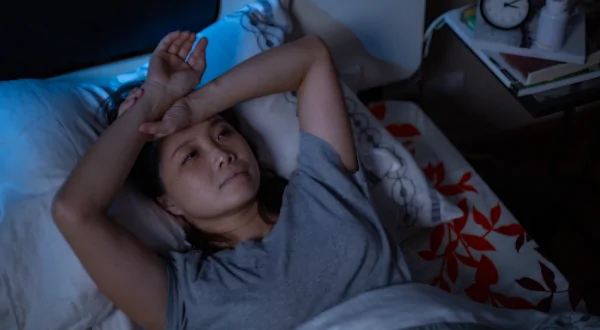The 5 different types of insomnia
- Dr Dipesh Mistry

Insomnia is a prevalent sleep disorder in the UK that significantly impacts individual health, professional productivity, and overall quality of life. While most people are familiar with the general concept of insomnia, they may not realise that it manifests in various forms. Differentiating between these types is crucial for accurate diagnosis and effective treatment. Addressing the specific type of insomnia ensures that healthcare providers can tailor interventions to target the root causes, improving patient outcomes and sleep quality. This article explores the five distinct types of insomnia, providing a detailed understanding of their symptoms, causes, and treatment options.
What is insomnia?
Insomnia is a sleep disorder characterised by persistent difficulties in initiating or maintaining sleep. It is often accompanied by symptoms such as frequent nighttime awakenings, early morning awakenings, or feeling unrefreshed despite adequate sleep duration. These disturbances can lead to significant daytime consequences, including fatigue, irritability, poor concentration, and reduced productivity.
Learn more about insomnia: What is insomnia and how can it be cured?
Transient insomnia
Transient insomnia is a short-term sleep disturbance that typically lasts less than a week. It is often associated with temporary external factors or situational stressors, making it the least severe form of insomnia. Despite its short duration, transient insomnia can disrupt daily life and lead to temporary impairments in mood and performance. Common symptoms of transient insomnia include difficulty falling asleep, frequent awakenings during the night, and feeling unrefreshed or groggy upon waking.
Situational stressors like upcoming exams, job interviews, or personal conflicts can temporarily disrupt sleep patterns. Rapid travel across multiple time zones can misalign the body’s internal clock, leading to temporary sleep difficulties. Moreover, minor health issues such as colds, fevers, or muscle pain can interfere with the ability to fall or stay asleep.
Treatment for transient insomnia includes relaxation techniques like breathing exercises, progressive muscle relaxation, and mindfulness meditation to calm the mind and promote sleep. Over-the-counter sleep aids, such as melatonin supplements or mild antihistamines, can offer temporary relief but should not be used long-term. Practicing good sleep hygiene, such as maintaining a consistent bedtime routine, reducing afternoon caffeine, and creating a comfortable sleep environment, can also help prevent it from worsening.
Short-term insomnia
Short-term insomnia, also known as acute insomnia, usually lasts for several weeks but resolves within three months. It is more persistent than transient insomnia and can significantly disrupt an individual’s daily routine and emotional well-being. Common symptoms include difficulty initiating or maintaining sleep, daytime fatigue, irritability, lack of motivation, and reduced cognitive performance, making it hard to concentrate or function effectively.
The causes of short-term insomnia often include stress and anxiety, with ongoing stressors such as work deadlines, work-family conflicts, or financial concerns being major contributors. Life changes, like moving to a new home or starting a new job, can also disrupt sleep routines. Additionally, surgery requiring extended healing periods may interfere with sleep quality.
Treatment for short-term insomnia involves a combination of therapeutic and lifestyle approaches. Cognitive Behavioral Therapy for Insomnia (CBT-I) is a proven intervention that addresses the thoughts and behaviours contributing to sleep difficulties through techniques like stimulus control, sleep restriction, and cognitive restructuring. In some cases, doctors may prescribe short-term medications, such as benzodiazepines or non-benzodiazepine hypnotics, to help restore a regular sleep pattern. Lifestyle modifications, including regular exercise, a balanced diet, and stress-reducing activities like yoga or tai chi, can also support better sleep and enhance overall well-being.
Chronic insomnia
Chronic insomnia is a long-term sleep disorder characterised by difficulty falling or staying asleep for at least three nights a week over a period of three months or longer. This condition can significantly affect both physical and mental health, making early diagnosis and treatment crucial. Common symptoms include prolonged difficulty in falling asleep, frequent night time awakenings, waking up too early without being able to return to sleep, persistent fatigue, irritability, and difficulty concentrating.
The causes of chronic insomnia are diverse and often interconnected. Medical conditions, such as chronic pain from arthritis or fibromyalgia, can make it challenging to sleep comfortably. Mental health disorders, including anxiety and depression, frequently coexist with chronic insomnia. Lifestyle factors such as poor sleep hygiene, irregular schedules, and excessive screen time before bed exacerbate the problem.
Chronic insomnia is rarely resolved with a single intervention, emphasising the need for comprehensive management. Cognitive Behavioral Therapy for Insomnia (CBT-I) is the first-line treatment for chronic insomnia and focuses on addressing the behavioural and cognitive patterns contributing to the condition. In more severe cases, prescription medications like daridorexant may be used alongside behavioural therapies to enhance outcomes. Lifestyle adjustments can also help to improve sleep quality over time.
Onset insomnia
Onset insomnia is a sleep disorder characterised by difficulty initiating sleep. Individuals with this condition often lie awake in bed for extended periods, struggling to transition into sleep despite feeling tired. This persistent difficulty can lead to frustration or anxiety about not being able to sleep, further exacerbating the problem. Common symptoms include prolonged difficulty falling asleep, anxiety or restlessness during bedtime, and daytime fatigue and irritability due to insufficient rest.
Several factors can contribute to the onset insomnia. Stress and anxiety are the primary causes, as racing thoughts or worries can increase arousal levels and make it hard to relax. Excessive consumption of stimulants, such as caffeine, nicotine, or energy drinks, can interfere with the body’s natural ability to initiate sleep. Environmental factors, such as bright lights, loud noises, or uncomfortable sleeping conditions, may also delay sleep onset and disrupt nighttime routines.
Treatment for onset insomnia includes relaxation techniques, including meditation, progressive muscle relaxation, and breathing exercises. Sleep hygiene practices are equally important; avoiding stimulating activities like using electronic devices close to bedtime can encourage a smoother transition into sleep. While medications may sometimes be used for short-term relief, non-pharmacological methods are generally preferred due to their long-term benefits and lack of side effects.
Maintenance insomnia
Maintenance insomnia is a sleep disorder characterised by difficulty staying asleep through the night or waking up too early and being unable to fall back asleep. Individuals with this condition often experience sleep fragmentation, resulting in insufficient restorative sleep. Common symptoms include waking up multiple times during the night, early morning awakenings with an inability to return to sleep, and persistent daytime fatigue and reduced alertness.
The causes of maintenance insomnia include medical conditions such as obstructive sleep apnoea, restless legs syndrome, and periodic limb movement disorder. Psychological factors also play a significant role; depression is often associated with early morning awakenings, while anxiety can heighten night time vigilance, making it difficult to stay asleep. Trauma and post-traumatic stress disorder (PTSD) can further contribute to maintenance insomnia, with nightmares or hyperarousal frequently interrupting the sleep process.
Treatment for maintenance insomnia focuses on addressing the underlying causes and adopting strategies to improve sleep continuity. Managing medical or psychiatric conditions, such as treating sleep apnoea or providing therapy for PTSD, is a critical first step in resolving sleep disturbances. Sometimes, short-term use of sleep aids may be recommended to regulate sleep. With appropriate intervention, individuals with maintenance insomnia can achieve more restorative sleep and enhance their overall quality of life.
Are you suffering from insomnia?
Recognising the specific type of insomnia is essential for effective treatment. Whether it is transient, short-term, chronic, onset, or maintenance insomnia, each type requires tailored interventions to address its unique symptoms and causes. By understanding these distinctions, individuals can seek the most appropriate care to improve their sleep quality and overall health.
If you’re struggling with any form of insomnia, seeking guidance from a sleep specialist can help you find effective and personalised treatment solutions. As an experienced sleep specialist in the UK, we offer personalised treatment plans to address your specific sleep challenges.
Summary
Here is a quick summary to help you digest the key points:
- Insomnia is a sleep disorder that makes it difficult to fall asleep at night
- There are 5 different types of insomnia: transient, short-term, chronic, onset and maintenance
- Insomnia of any type often presents with symptoms of fatigue, daytime sleepiness and irritability. Sometimes it may be associated with other medical conditions such as sleep apnoea or PTSD.
- Options for treating sleeping difficulties yourself include improving your sleep hygiene and environment, breathing exercises, and not consuming caffeine before bed.
- The gold standard treatment for insomnia is CBT-I.
- If you suspect you have insomnia, it is essential to consult a sleep specialist to receive the best advice possible.






